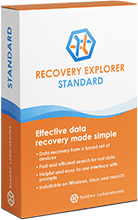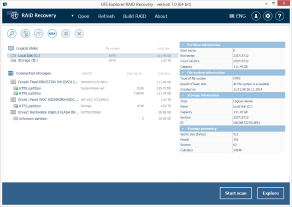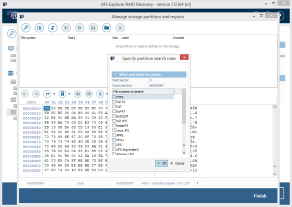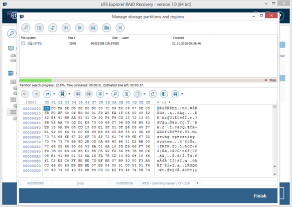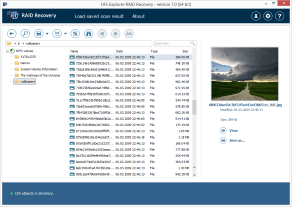Recovery Explorer Standard

Recovery Explorer Standard is an effective and at the same time exceedingly straightforward application meant for coping with commonplace data recovery tasks. Installed on Windows, Linux or macOS, the cross-platform software operates with various internal and external storage devices, along with disk images and virtual disks. Better yet, its friendly interface, helpful prompts and an optional simplified Wizard-based mode make every step as easy as can be.
A user-friendly solution to typical data loss incidents

deletion

corruption

formatting
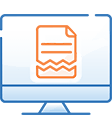
crashes

attacks
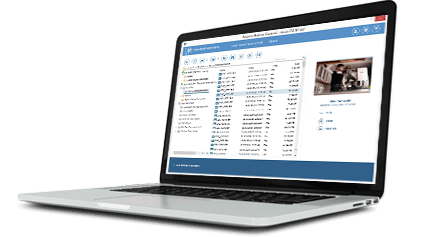
- PCs/laptops
- Hard disk drives
- External USB disks
- USB flash drives
- Memory cards
- Music players
- Digital cameras
- Other storage devices
 Documents
Documents Images
Images
 Audio files
Audio files Videos
Videos
 E-mails
E-mails Any other file format
Any other file format
Key features
The utility is capable of working with diverse physical storage systems: embedded and portable hard drives of PCs or laptops, memory cards of smartphones, photo or video cameras, USB sticks and others. Virtual digital media can be processed by the software as well, including disk images of different formats and virtual disks of VMware, Hyper-V, VirtualBox, QEMU and XEN.
Recovery Explorer Standard makes it possible to restore lost or deleted data from a broad set of file systems that may be applied in Windows (FAT/FAT32/exFAT and NTFS), macOS (APFS, HFS+) and Linux (XFS, Ext2, Ext3, Ext4, Linux JFS, ReiserFS, UFS/UFS2, big-endian UFS, Btrfs). Moreover, the software allows browsing the intact folders and files without prior scanning and copying them to another location.
The application offers several scanning options: it is possible to choose between a quick scan and a longer profound search for lost data by known content (using the IntelliRAW technology), scan only the space occupied by a certain file system or exclude it from a scan. The user can pause the scanning process anytime, check or save the intermediate results or save the final result of the operation for further references.
The software is enhanced with auxiliary tools for previewing found files of most common formats, sorting them by the date, size and name, performing a quick or advanced search with multiple criteria, checking the size of the selected data and others. Furthermore, it is possible to see the S.M.A.R.T. status of connected drives and, if needed, create a disk image of a storage right in the software.
Recovery Explorer Standard combines professional data extraction techniques with a user-friendly interface which makes the software accessible for users with no previous experience in data recovery. The optional simplified mode (Wizard-based mode) allows restoring data with just several clicks of a mouse while the helpful interface guides through the procedure by showing useful tips and prompts.
What's New in Version 10.8
- In VHDX/AVHDX format: added support of embedded log (transaction journal) to support 'virtual' log replay in case of 'dirty' virtual disk detachment;
- When scan result is restored to a different offset (from a disk/partition context menu) a confirmation warning message now appears;
- In file system direct access mode: added a function to calculate and show capacities of subfolders (size and count of files inside);
- Added support of NVMe SMART reporting in software version for Linux OS;
- ReFS file system: added support of 'resident' files for both 'Access' and 'Scan' (small files stored in metadata with file system format 3.14 or later);
- FAT/FAT32 scan:
- Removed some 'junk' objects that can appear during 'indexing' stage of scan;
- Added support of older SONY camera style file deletion (indication with zero instead of E5h byte);
- In embedded viewer: added support of PDF documents in 'version 2' format and fixed few PDF format-related issues;
- In raw recovery:
- Added detection of PDF in format version 2;
- Fixed bug that caused some PDF files to be classified by mistake as Adobe Illustrator (AI) files;
- Added search for 'real' file size of PDF and AI documents (when possible).
Frequently asked questions
-
You can download the free Trial version of Recovery Explorer RAID from this webpage and use it to make sure that the product corresponds to your requirements. The trial software will present all the recovered data and allow copying files with a size of less than 256 KB. Copying bigger files requires activation of the software license.
-
UFS Explorer Standard Recovery may serve as a perfect alternative to Recovery Explorer Standard for specialists in the field of data recovery. Please refer to the comparison page to find out the difference in the functional capabilities of these product editions and decide which of them is a better match to your needs.
-
A license should be selected in accordance with the intended use of the software. The Personal License can be used by a single individual only for personal or educational purposes on home PCs or one computer at work. The Corporate License can be used on up to ten computers owned by a legal entity, company or organization for corporate non-profit or educational purposes. The Commercial License can be used on one computer owned by a legal entity, company or organization for commercial purposes and providing services. For more detailed information please refer to the software license page.
-
The license for the software will be provided after a one-time payment of the corresponding license fee. To place an order use the "Buy License" button on this webpage or the "Order license" button from the "Software Activation and License" dialog in the software interface. Choose the needed license type and the operating system you are going to use for the installation of the software. Please note that a single license is applicable for a specific version of the product for one operating system (e.g. Windows OS, both 32-bit and 64-bit) and running the software in other environments requires activating different software licenses. Press "To Checkout" and fill out the billing form. The information needed for the purchase includes first name, last name, address, city, country and email address. All the data and the transaction will be securely processed by our sales partner 2Checkout according to the market security standards.
-
Our sales partner 2Checkout provides a variety of payment options, including Visa/MasterCard, PayPal, American Express, Discover, WebMoney, wire transfer, etc. and allows performing the payment in any currency. For more details, please, visit the global payments page on their website.
-
A Registration Code is issued to either the person's (entrepreneur’s) name or company's name once the payment is processed and is delivered to the email address specified in the order. The delivery is electronic and usually takes about 15-45 minutes.
-
A Registration Code will be sent to the email address specified in your purchase order. To activate the license, download a free Trial version of the software and enter your name with the Registration Code from the email in the "Software Activation and License" dialog.
-
Download the updated version of Recovery Explorer Standard from this webpage and follow the steps of "fresh" software installation. Alternatively, you can do that by following the prompts in the software interface.
Other Recovery Explorer products
-
FAT/FAT32, exFAT, NTFS, ReFS/ReFS3;
-
HFS+, APFS;
-
Ext2, Ext3, Ext4, XFS, JFS, ReiserFS, Btrfs, UFS/UFS2, Adaptec UFS, big-endian UFS.
-
NTFS:
full support: data access, search for lost partitions, recovery of deleted files, recovery after formatting and file system damage. -
FAT/FAT32/exFAT:
full support: data access, search for lost partitions, recovery of deleted files, recovery after formatting and file system damage. -
ReFS/ReFS3:
full support: data access, search for lost partitions, recovery of deleted files, recovery after formatting and file system damage. -
Apple HFS+:
full support: data access, search for lost partitions, recovery of deleted files, recovery after file system damage. -
APFS:
full support: data access, search for lost partitions, recovery of deleted files, recovery after file system damage. -
Ext2/Ext3/Ext4:
full support: data access, search for lost partitions, recovery of deleted files, recovery after file system damage. -
XFS:
full support: data access, search for lost partitions, recovery of deleted files, recovery after formatting and file system damage. -
Linux JFS:
full support: data access, search for lost partitions, deleted files recovery, recovery after format and recovery after file system damage. -
ReiserFS:
full support: data access, search for lost partitions, recovery of deleted files, recovery after formatting and file system damage. -
Btrfs:
full support: data access, search for lost partitions, deleted files recovery, recovery after format and recovery after file system damage. -
UFS/UFS2, Adaptec UFS, big-endian UFS:
data access, search for lost partitions, RAID recovery for both little-endian and big-endian variations, recovery after file system damage, very limited support of deleted data recovery.
-
Spanned volumes: LVM, Windows Dynamic Disks, Apple Software RAID;
-
Virtual disks and disk images: VMware (VMDK), Hyper-V (VHD/VHDX), QEMU/XEN (QCOW/QCOW2), VirtualBox (VDI), Apple Disk Images (DMG), R-Studio image files (RDR), simple disk images;
-
Auxiliary options: simplified Wizard-based mode, files preview, search, sorting, filtering and others;
-
Tools for low-level data analysis: hexadecimal viewer (for files);
-
Features for work with damaged disks: basic disk imager, S.M.A.R.T. monitor for drives, event log.
-
The software will copy files the size of which doesn’t exceed 256 KB.
-
Microsoft Windows ®: starting from Windows® XP with Service Pack 3 and later;
-
macOS: all versions starting from 10.15;
-
Linux: Debian Linux 6.0 (or compatible) and above.
-
Intel Architecture, 32-bit (IA-32, x86);
-
AMD64 (x86-64).
-
Any of the supported host operating systems;
-
at least 20 MB of free space on the disk for the executable files of the software;
-
at least 1 GB of RAM;
-
the Linux software version can run from most modern Linux Live CDs.
-
A 64-bit edition of any of the supported host operating systems;
-
over 1 GB of free space on the disk for the program and temporary files;
-
at least 2 GB of RAM and 4 logical cores CPU;
-
any web browser.
